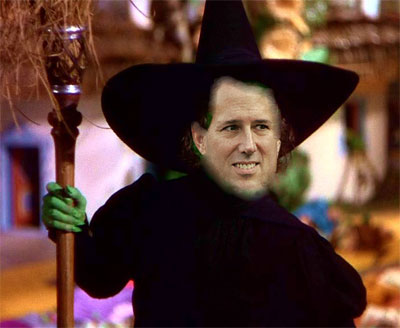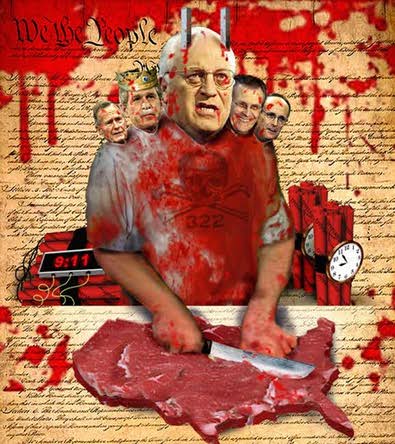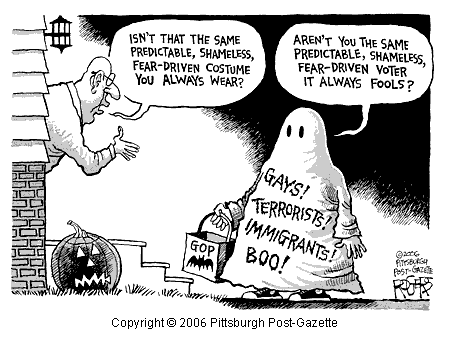2006: The Year of the ‘Macaca’
OF course, the “thumpin’ ” was all about Iraq. But let us not forget Katrina. It was the collision of the twin White House calamities in August 2005 that foretold the collapse of the presidency of George W. Bush.
.jpg)
Back then, the full measure of the man finally snapped into focus for most Americans, sending his poll numbers into the 30s for the first time. The country saw that the president who had spurned a grieving wartime mother camping out in the sweltering heat of Crawford was the same guy who had been unable to recognize the depth of the suffering in New Orleans’s fetid Superdome. This brand of leadership was not the “compassionate conservatism” that had been sold in all those photo ops with African-American schoolchildren. This was callous conservatism, if not just plain mean.
It’s the kind of conservatism that remains silent when Rush Limbaugh does a mocking impersonation of Michael J. Fox’s Parkinson’s symptoms to score partisan points. It’s the kind of conservatism that talks of humane immigration reform but looks the other way when candidates demonize foreigners as predatory animals. It’s the kind of conservatism that pays lip service to “tolerance” but stalls for days before taking down a campaign ad caricaturing an African-American candidate as a sexual magnet for white women.
This kind of politics is now officially out of fashion. Harold Ford did lose his race in Tennessee, but by less than three points in a region that has not sent a black man to the Senate since Reconstruction. Only 36 years old and hugely talented, he will rise again even as the last vestiges of Jim Crow tactics continue to fade and Willie Horton ads countenanced by a national political party join the Bush dynasty in history’s dustbin.
Elsewhere, the 2006 returns more often than not confirmed that Americans, Republicans and Democrats alike, are far better people than this cynical White House takes them for. This election was not a rebuke merely of the reckless fiasco in Iraq but also of the divisive ideology that had come to define the Bush-Rove-DeLay era. This was the year that Americans said a decisive no to the politics of “macaca” just as firmly as they did to pre-emptive war and Congressional corruption.
For all of Mr. Limbaugh’s supposed clout, his nasty efforts did not defeat the ballot measure supporting stem-cell research in his native state, Missouri. The measure squeaked through, helping the Democratic senatorial candidate knock out the Republican incumbent. (The other stem-cell advocates endorsed by Mr. Fox in campaign ads, in Maryland and Wisconsin, also won.) Arizona voters, despite their proximity to the Mexican border, defeated two of the crudest immigrant-bashing demagogues running for Congress, including one who ran an ad depicting immigrants menacing a JonBenet Ramsey look-alike. (Reasserting its Goldwater conservative roots, Arizona also appears to be the first state to reject an amendment banning same-sex marriage.) Nationwide, the Republican share of the Hispanic vote fell from 44 percent in 2004 to 29 percent this year. Hispanics aren’t buying Mr. Bush’s broken-Spanish shtick anymore; they saw that the president, despite his nuanced take on immigration, never stood up forcefully to the nativists in his own camp when it counted most, in an election year.
But for those who’ve been sickened by the Bush-Rove brand of politics, surely the happiest result of 2006 was saved for last: Jim Webb’s ousting of Senator George Allen in Virginia. It is all too fitting that this race would be the one that put the Democrats over the top in the Senate. Mr. Allen was the slickest form of Bush-Rove conservative, complete with a strategist who’d helped orchestrate the Swift Boating of John Kerry. Mr. Allen was on a fast track to carry that banner into the White House once Mr. Bush was gone. His demise was so sudden and so unlikely that it seems like a fairy tale come true.
As recently as April 2005, hard as it is to believe now, Mr. Allen was chosen in a National Journal survey of Beltway insiders as the most likely Republican presidential nominee in 2008. Political pros saw him as a cross between Ronald Reagan and George W. Bush whose “affable” conservatism and (contrived) good-old-boy persona were catnip to voters. His Senate campaign this year was a mere formality; he began with a double-digit lead.
That all ended famously on Aug. 11, when Mr. Allen, appearing before a crowd of white supporters in rural Virginia, insulted a 20-year-old Webb campaign worker of Indian descent who was tracking him with a video camera. After belittling the dark-skinned man as “macaca, or whatever his name is,” Mr. Allen added, “Welcome to America and the real world of Virginia.”
The moment became a signature cultural event of the political year because the Webb campaign posted the video clip on YouTube.com, the wildly popular site that most politicians, to their peril, had not yet heard about from their children. Unlike unedited bloggorhea, which can take longer to slog through than Old Media print, YouTube is all video snippets all the time; the one-minute macaca clip spread through the national body politic like a rabid virus. Nonetheless it took more than a week for Mr. Allen to recognize the magnitude of the problem and apologize to the object of his ridicule. Then he compounded the damage by making a fool of himself on camera once more, this time angrily denying what proved to be accurate speculation that his mother was a closeted Jew. It was a Mel Gibson meltdown that couldn’t be blamed on the bottle.
Mr. Allen has a history of racial insensitivity. He used to display a Confederate flag in his living room and, bizarrely enough, a noose in his office for sentimental reasons that he could never satisfactorily explain. His defense in the macaca incident was that he had no idea that the word, the term for a genus of monkey, had any racial connotation. But even if he were telling the truth — even if Mr. Allen were not a racist — his non-macaca words were just as damning. “Welcome to America and the real world of Virginia” was unmistakably meant to demean the young man as an unwashed immigrant, whatever his race. It was a typical example of the us-versus-them stridency that has defined the truculent Bush-Rove fearmongering: you’re either with us or you’re a traitor, possibly with the terrorists.
As it happened, the “macaca” who provoked the senator’s self-destruction, S. R. Sidarth, was not an immigrant but the son of immigrants. He was born in Washington’s Virginia suburbs to well-off parents (his father is a mortgage broker) and is the high-achieving graduate of a magnet high school, a tournament chess player, a former intern for Joe Lieberman, a devoted member of his faith (Hindu) and, currently, a senior at the University of Virginia. He is even a football jock like Mr. Allen. In other words, he is an exemplary young American who didn’t need to be “welcomed” to his native country by anyone. The Sidarths are typical of the families who have abetted the rapid growth of northern Virginia in recent years, much as immigrants have always built and renewed our nation. They, not Mr. Allen with his nostalgia for the Confederate “heritage,” are America’s future. It is indeed just such northern Virginians who have been tinting the once reliably red commonwealth purple.
Though the senator’s behavior was toxic, the Bush-Rove establishment rewarded it. Its auxiliaries from talk radio, the blogosphere and the Wall Street Journal opinion page echoed the Allen campaign’s complaint that the incident was inflated by the news media, especially The Washington Post. Once it became clear that Mr. Allen was in serious trouble, conservative pundits mainly faulted him for running an “awful campaign,” not for being an awful person.
The macaca incident had resonance beyond Virginia not just because it was a hit on YouTube. It came to stand for 2006 as a whole because it was synergistic with a national Republican campaign that made a fetish of warning that a Congress run by Democrats would have committee chairmen who are black (Charles Rangel) or gay (Barney Frank), and a middle-aged woman not in the Stepford mold of Laura Bush as speaker. In this context, Mr. Allen’s defeat was poetic justice: the perfect epitaph for an era in which Mr. Rove systematically exploited the narrowest prejudices of the Republican base, pitting Americans of differing identities in cockfights for power and profit, all in the name of “faith.”
Perhaps the most interesting finding in the exit polls Tuesday was that the base did turn out for Mr. Rove: white evangelicals voted in roughly the same numbers as in 2004, and 71 percent of them voted Republican, hardly a mass desertion from the 78 percent of last time. But his party was routed anyway. It was the end of the road for the boy genius and his can’t-miss strategy that Washington sycophants predicted could lead to a permanent Republican majority.
What a week this was! Here’s to the voters of both parties who drove a stake into the heart of our political darkness. If you’ll forgive me for paraphrasing George Allen: Welcome back, everyone, to the world of real America.






































